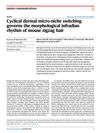February 2023 in “International journal of molecular sciences” Infrared spectral imaging can effectively study protein distribution in hair follicles during hair growth.
854 citations,
February 2002 in “The journal of investigative dermatology/Journal of investigative dermatology” Understanding hair follicle development can help treat hair loss, skin regeneration, and certain skin cancers.
November 2019 in “SLAS technology” New findings suggest certain genes and microRNAs are crucial for wound healing, and innovative technologies like smart bandages and apps show promise in improving treatment.
[object Object]  December 2024 in “Medical Review”
December 2024 in “Medical Review” Organoids help study and treat genetic diseases, offering personalized medicine and therapy testing.
 6 citations,
November 2022 in “Development”
6 citations,
November 2022 in “Development” New research shows that skin diversity is influenced by different types of dermal fibroblasts and their development, especially involving the Wnt/β-catenin pathway.

Regenerative cosmetics can improve skin and hair by reducing wrinkles, healing wounds, and promoting hair growth.
 January 2025 in “PLoS ONE”
January 2025 in “PLoS ONE” Elf5 controls skin cell growth and development, making it a potential target for skin treatments.
161 citations,
August 2012 in “Seminars in cell & developmental biology” Hair growth and development are controlled by specific signaling pathways.
Researchers made a mouse model with curly hair and hair loss by editing a gene.
 24 citations,
April 2020 in “Cells”
24 citations,
April 2020 in “Cells” DNA methylation and long non-coding RNAs are key in controlling hair growth in Cashmere goats.
 39 citations,
January 2019 in “Cells”
39 citations,
January 2019 in “Cells” Gene therapy has potential as a future treatment for Hutchinson-Gilford progeria syndrome.
128 citations,
August 2020 in “Cell stem cell” Dermal fibroblasts have adjustable roles in wound healing, with specific cells promoting regeneration or scar formation.
 50 citations,
September 2014 in “Stem cell reports”
50 citations,
September 2014 in “Stem cell reports” BLIMP1 is essential for skin maintenance but not for defining sebaceous gland progenitors.
22 citations,
April 2022 in “Stem cell research & therapy” Hair follicle-derived extracellular vesicles may help heal chronic wounds as effectively as those from adipose tissue.
 4 citations,
August 2023 in “Nature Communications”
4 citations,
August 2023 in “Nature Communications” Mouse zigzag hair bends form due to a 3-day cycle of changes in hair progenitors and their environment.
 26 citations,
January 2019 in “Experimental Dermatology”
26 citations,
January 2019 in “Experimental Dermatology” Researchers created early-stage hair-like structures from skin cells, showing how these cells can self-organize, but more is needed for complete hair growth.
 11 citations,
July 2017 in “Regenerative Medicine”
11 citations,
July 2017 in “Regenerative Medicine” The patch assay can create mature hair follicles from human cells and may help in hair loss treatments.
 May 2020 in “Research Square (Research Square)”
May 2020 in “Research Square (Research Square)” Researchers found four key stages of cell development that are important for hair growth and shedding in cashmere goats.
[object Object]  163 citations,
March 2012 in “BMC biology”
163 citations,
March 2012 in “BMC biology” Stem cell niches support, regulate, and coordinate stem cell functions.
 74 citations,
January 2013 in “Expert Opinion on Biological Therapy”
74 citations,
January 2013 in “Expert Opinion on Biological Therapy” The conclusion is that hair growth can be improved by activating hair cycles, changing the surrounding environment, healing wounds to create new hair follicles, and using stem cell technology.
 40 citations,
January 2009 in “Skin Pharmacology and Physiology”
40 citations,
January 2009 in “Skin Pharmacology and Physiology” Fetal cells could improve skin repair with minimal scarring and are a potential ready-to-use solution for tissue engineering.
 22 citations,
October 2012 in “Cell Transplantation”
22 citations,
October 2012 in “Cell Transplantation” Cells treated with Wnt-10b can grow hair after being transplanted into mice.
 7 citations,
September 2019 in “Journal of Cellular Physiology”
7 citations,
September 2019 in “Journal of Cellular Physiology” Akt2 protein is essential for normal cell division in early mouse embryos.
 133 citations,
May 2016 in “Cell Host & Microbe”
133 citations,
May 2016 in “Cell Host & Microbe” Human dermal fibroblasts are the main cells targeted by a virus that can cause a deadly skin cancer, and a certain inhibitor can effectively block this infection.
 33 citations,
September 2016 in “British journal of dermatology/British journal of dermatology, Supplement”
33 citations,
September 2016 in “British journal of dermatology/British journal of dermatology, Supplement” Human hair follicle dermal cells can effectively replace other cells in engineered skin.
 7 citations,
April 2014 in “Cell biology international”
7 citations,
April 2014 in “Cell biology international” Melatonin treatment helps improve skin health in postmenopausal rats.
 4 citations,
February 2021 in “Nano select”
4 citations,
February 2021 in “Nano select” MSC-Exos can aid organ development and offer therapeutic benefits for various conditions.
 4 citations,
August 2020 in “Applied Materials Today”
4 citations,
August 2020 in “Applied Materials Today” Hydrogel microcapsules help create cells that boost hair growth.
 January 2018 in “Stem cell biology and regenerative medicine”
January 2018 in “Stem cell biology and regenerative medicine” ATP-dependent chromatin remodeling is crucial for skin development and stem cell function.
 28 citations,
March 2010 in “Histochemistry and cell biology”
28 citations,
March 2010 in “Histochemistry and cell biology” Skin cells can help create early hair-like structures in lab cultures.






















